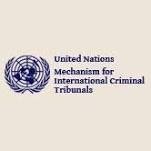Org. Setting and Reporting
This position is located in the Office of the Prosecutor at the Arusha branch of the International Residual Mechanism for Criminal Tribunals. The incumbent will work under the direct supervision of the Prosecutor and in close coordination with the Chief of Staff, Senior Legal Officer at The Hague branch and other senior staff.
Responsibilities
- Contribute to the implementation of the Prosecutor’s “One Office” policy.
- Coordinates and directs teams of other legal and non-legal staff members, guides and supervises the work of junior staff members; assists the Prosecutor and Chief of Staff with the general management and administration of the OTP, IRMCT, Arusha branch, organizes and prioritizes the workload of the Office’s continuous residual functions and contributes to the general coordination of the work of the OTP.
- In coordination with the Chief of Staff, carries out or oversees the carrying out of the day-to-day administrative tasks necessary for the functioning of the OTP, Arusha branch, including the preparation of inputs to budgets, monitoring of performance parameters and critical indicators, reporting on budget/programme performance, preparation of inputs for results-based budgeting, evaluation of staff performance (PAS) and evaluation of candidates for job openings including interviewing them.
- In coordination with the Senior Legal Officer Hague branch, proposes and provides input on rule amendments, policies and guidelines as well as memoranda from other organs. Coordinates the provision of legal assistance to national prosecuting and judicial authorities;
- In coordination with the Senior Appeals Counsel and Senior Legal Officer Hague branch, advises the Prosecutor on a range of legal matters; provides authoritative legal and policy advice to the Prosecutor regarding the continuous residual functions of the Arusha branch, including the referral of cases to national jurisdictions, the initiation of contempt proceedings, requests for review of judgments by convicted persons and requests for early release filed by convicted persons.
- In coordination with the Chief of Staff, Tracking Team leader and Legal Officers overseeing fugitive files, coordinates and supervises investigations needed to support the continuous residual functions and case-related activities of the OTP, Arusha branch, including investigations into instances of contempt of court, the monitoring of cases referred to national jurisdictions for trial and the maintenance of and access to documents and evidentiary material within the OTP, Arusha branch.
- Appears before the Chambers of the IRMCT and advocates on behalf of the Prosecutor, prepares and reviews legal filings for submission to the IRMCT, Arusha branch with respect to the continuous residual functions of the OTP.
- Represents the Prosecutor at meetings with high-level officials of governmental and non-governmental organizations and with the media; services diplomatic conferences, commissions, committees, task forces, expert groups and other bodies, including preparation of background materials, summaries of issues and views of delegations, meeting reports, etc.; represents the OTP in discussions with the Chambers and the Registry at the Arusha branch.
- Assists and supports the Tracking Team Leader and Legal Officers overseeing fugitive files.
- Assists and supports the work of the OTP, The Hague branch of the IRMCT as required.
Competencies
- Professionalism: Knowledge of international legal procedures and instruments, including international criminal law, with a particular emphasis on the legal practice of the former ICTR and/or the ICTY. Sound knowledge of the functioning of criminal investigations and prosecutions at the national and international levels. Ability to apply legal expertise to analyzing a diverse range of complex issues and in developing innovative solutions. Strong analytical skills and proficiency in legal writing and expression and ability to prepare legal documents. Strong negotiating skills and ability to persuade others to reach agreement. Extensive experience in the management of staff. Experience and ability to work well in a multicultural environment. Ability to work to tight deadlines and to handle multiple concurrent projects. Shows pride in work and in achievements. Demonstrates professional competence and mastery of subject matter. Is conscientious and efficient in meeting commitments, observing deadlines and achieving results. Is motivated by professional rather than personal concerns. Shows persistence when faced with difficult problems or challenges. Remains calm in stressful situations.
- Communication – Speaks and writes clearly and effectively. Listens to others, correctly interprets messages from others and responds appropriately. Asks questions to clarify, and exhibits interest in having two way communication. Tailors language, tone, style and format to match the audience. Demonstrates openness in sharing information and keeping people informed.
- Teamwork – Works collaboratively with colleagues to achieve organisational goals. Solicits input by genuinely valuing others’ ideas and expertise; is willing to learn from others. Places team agenda before personal agenda. Supports and acts in accordance with final group decision, even when such decisions may not entirely reflect own position. Shares credit for team accomplishments and accepts joint responsibility for team shortcomings.
- Leadership – Serves as a role model that other people want to follow. Empowers others to translate vision into results. Is proactive in developing strategies to accomplish objectives. Establishes and maintains relationships with a broad range of people to understand needs and gain support. Anticipates and resolves conflicts by pursuing mutually agreeable solutions. Drives for change and improvement; does not accept the status quo. Shows the courage to take unpopular stands.
Provides leadership and takes responsibility for incorporating gender perspectives and ensuring the equal participation of women and men in all areas of work. - Judgement/Decision-making – Identifies the key issues in a complex situation, and comes to the heart of the problem quickly. Gathers relevant information before making a decision. Considers positive and negative impacts of decisions prior to making them. Takes decisions with an eye to the impact on others and on the Organisation. Proposes a course of action or makes a recommendation based on all available information. Checks assumptions against facts. Determines that the actions proposed will satisfy the expressed and underlying needs for the decision. Makes tough decisions when necessary.
Education
Advanced university degree (Master’s degree or equivalent) in law. First-level university degree in combination with two additional years of qualifying experience may be accepted in lieu of the advanced university degree. Postgraduate studies in criminal or international law would be an asset.
Work Experience
At least ten years of progressively responsible experience in criminal prosecution, including substantial experience at the international level.
Relevant experience at the ICTR or ICTY is highly desirable.
Languages
Fluency in English (both oral and written) is required; knowledge of French would be an asset.
Assessment
There may be a technical test followed by a competency-based interview.
Special Notice
The United Nations Secretariat is committed to achieving 50/50 gender balance in its staff. Female candidates are strongly encouraged to apply for this position.
The appointment is limited to the International Residual Mechanism for Criminal Tribunals. Appointment of the successful candidate on this position will be limited to the initial funding of the post. Extension of the appointment is subject to the extension of the mandate and/or the availability of funds. As the international tribunals are not integrated in the Secretariat, UN Staff Members serve on assignment or secondment from their parent department/office if selected. Appointments of staff members in the United Nations are subject to the authority of the Secretary-General. Staff Members are expected to move periodically to new functions in accordance with established rules and procedures, and may in this context be reassigned by the Secretary-General throughout the Organization based on the changing needs and mandates.
NOTE FOR PREVIOUSLY ROSTERED CANDIDATES
Roster candidates must express their interest and availability for published job openings by submitting an updated PHP and cover letter.


